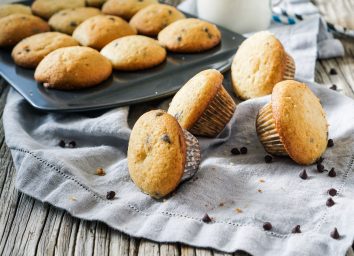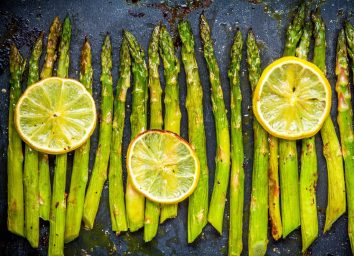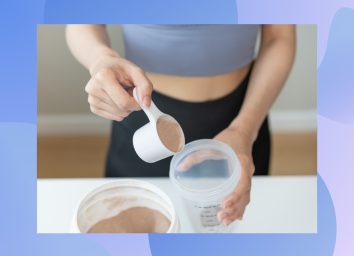These Are the Foods To Eat for a Healthy Vagina, According To a Gynecologist

Food works in many beautiful ways. Not only does it give you energy, but it also replenishes and repairs your muscles after a workout. Even more impressive is certain foods' ability to support the immune system so that you can combat illness and infection. There are even certain foods that keep your reproductive organs healthy as well. For women, this is especially important, as the vagina is a sensitive area, and one key way to maintain a healthy vagina is to eat foods that nourish it.
Probiotics are essential for vaginal health, as they can prevent the overgrowth of harmful bacteria in the gut, which can spur infection and other complications in the vagina. We spoke with Dr. Carolyn Delucia, MD, FACOG for insight on which foods are rich in probiotics as well as others that support vaginal health. (Related: 21 Best Healthy Cooking Hacks of All Time)
Why are probiotics so important for vaginal health?
"All vaginas contain many types of microorganisms—bacteria and yeast—known as the vaginal microbiome. The healthiest of our microbiome is the lactobacillus bacteria species. Lactobacilli act as a barrier to infection by preventing disease-causing organisms from attaching to the vagina's surface and by producing chemicals such as lactic acid that inactivate or kill other organisms," explains Delucia. "Changes or disturbance of [the] microbiome can increase the risk for infection by disease-causing microorganisms."
To clarify, lactobacillus is a good type of bacteria that naturally occur in your intestines, vagina, and even in your mouth. This bacteria is found in probiotics, as well. Delucia says that probiotics—as well as prebiotics—work as great mechanisms to prevent and, in some cases, treat vaginal infections.
Remember, probiotics and prebiotics work hand-in-hand. Prebiotics are essentially fibers that we cannot digest, as Patricia Bannan, MS, RDN, and author of Eat Right When Time is Tight told us in our article No, Probiotics and Prebiotics Aren't the Same Thing After All. How then do our bodies use prebiotics, exactly? Prebiotics are actually consumed by probiotics in the gut. In other words, prebiotics create a healthy environment for that good gut bacteria (probiotics) to flourish.
"Therefore, eating foods with high amounts of probiotics may help maintain the pH of the vagina," Delucia adds. Maintaining a healthy pH is critical for vaginal health, as disrupting the vagina's natural, mildly acidic environment can make it more susceptible to common infections such as yeast infections and bacterial vaginosis.
Fermented foods are especially rich in gut-healthy probiotics. According to Delucia, the process of fermentation promotes the growth of probiotics, so foods such as sauerkraut, kimchi, and even kombucha pack a lot of probiotics.
Another food that's chock-full of probiotics is yogurt. Has your doctor ever instructed you to eat yogurt while taking antibiotics? That's because antibiotics kill both the harmful, infection-causing bacteria as well as the good bacteria, so increasing your yogurt intake may help to restore that beneficial bacteria more quickly as your body fights the infection.
Of course, you could always take a probiotic supplement. Mary Jane Minkin, MD, OB/GYN at Yale University recommends RepHresh Pro-B to her patients.
"The reason I tell them Pro-B is that the particular organisms in Pro-B are the closest to the 'good guy bacteria' of the vagina, which make acid and discourage the growth of the bad guy bacteria, says Minkin. "Indeed, you want your vagina to be acidic and the lactobacilli in the Pro-B make the acid which protects the vagina."
Which anti-fungal and anti-microbial foods are good for the vagina, and how exactly do they help fight infection?
There are several foods you can eat to combat common vaginal infections, such as a yeast infection. Yeast infections are caused by the overgrowth of a certain fungus called Candida. Candida can grow uncontrollably for a number of reasons, including taking too many rounds of antibiotics, which can deplete your supply of good gut bacteria. Candida albicans are also known to feast on sugar—something to note if you consume a high-sugar diet. The condition of Candida overpopulating is known as Candidiasis, which can occur in both the gut and the vagina, and causes a yeast infection.
Minkin advises against eating foods that are high in sugar on a regular basis for this reason. She tells her patients, "yeast love sugar, and you don't want to feed the yeast." Dr. Delucia recommends satisfying that sweet craving by eating a variety of vitamin-rich fruits.
"Foods [that are] high in vitamin C such as strawberries, bell peppers, and citrus fruits are important for upping your immune system and fighting infections down south," she says. "Fresh cranberries are full of antioxidants and acidic compounds, which are strong infection fighters that help bacteria adhering to the bladder wall and help in preventing recurrent UTI issues."
She also says that garlic is known for its antimicrobial properties and, "eating it raw can help fight yeast infections."
Are there any specific vitamins that help to maintain a healthy vagina?
"Vitamin A contributes to healthy vaginal and uterine walls and helps us produce the hormones we need to stay vibrant," says Delucia. Foods that are rich in vitamin A include sweet potatoes, pumpkin, and mango.
What foods can increase libido?
Foods that are rich in heart-healthy omega-3 fatty acids—such as oily fish like salmon—in addition to avocados and flaxseed oil all work to promote circulation around the body. Delucia says this is important because this allows for increased blood flow to the vagina, which will ultimately boost your libido. Magnesium is another such mineral that can help facilitate circulation and improve your sex drive.
"Spinach is rich in magnesium, which is a mineral that decreases inflammation in blood vessels and increases blood flow," says Delucia.








